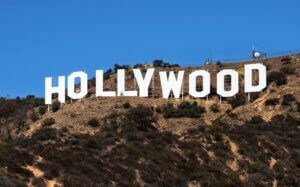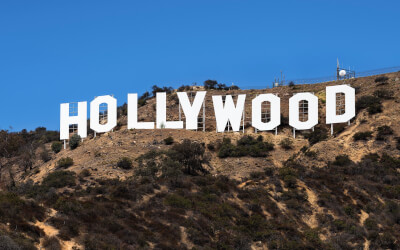Will Smith violence takes Oscar protests to dangerous level
When Hollywood actor Will Smith walked on stage of the 94th Academy of Arts and Sciences Oscars Award on Sunday March 27, 2022, and punched comedian Chris Rock in the face with an open fist, he elevated and personalized what has been an occasional occurrence of protests that have taken place at the annual celebration of Hollywood movies and actors. But Smith took the protests to a new level of violence. Here’s a review of some of the past protests
By Ray Hanania
The annual Academy Awards presents the golden statue “Oscar” for symbolizing the best work and performances in the making of Hollywood movies, recognizing how well an individual can pretend in a professional way to be something other than what they are.
But until this week, when actor Will Smith punched comedian 94th Academy Awards entertainer Chris Rock in the face Sunday, the controversies have only involved rhetorical violence.
It was the first time physical violence took center stage at the Oscars even though in many of the 94 Academy Award events, physical violence was sought against racism and discrimination.
One of the first controversies in the nearly 100 year long history of the Oscars took place at the 45th Academy Awards on March 27, 1973 when Marlon Brando refused to accept the Oscar for Best Actor in his role as the mafia family chieftain in the blockbuster hit, “The Godfather.”

Brand sent a Native American woman, Sacheen Littlefeather, who dressed in her Apache heritage garb announced at the microphone that Brando “could not accept this very generous award,” the Oscar, because of “the treatment of American Indians today by the film industry, and on television and movie reruns and also with recent happenings at “Wounded Knee” which drew a mix of cheers and jeers.
Wounded Knee is the site of the massacre of the December 29, 1890 massacre of 300 Oglala Lakota Indians (Sioux) by the U.S. Cavalry, and the protest decades later on Feb. 27, 1973 in which Federal Marshalls shot and killed two Lakota Indians when a group of 200 took over the town in continued protest.
Palestinians were drawn into the ire of the 50th Academy Awards on April 3, 1978, when the Oscar for “Best Supporting Actress” went to Vanessa Redgrave for her portrayal in the Holocaust film “Julia.”
In the movie Julia, Redgrave plays Julia, in the true story of an activist who tried to help rescue Jews from the Nazis. Julia is tortured and later killed by the Nazi SS but her friend Lillian lives to share the story.
But when Redgrave stepped to the microphone to accept the award, she included her revulsion against what she called the “Zionist hoodlums” of the Jewish Defense League led by vicious anti-Arab hater and American Jewish terrorist, Meir Kahane who were outside the Academy Awards calling for her death.
The JDL, accused of being responsible for the murder of seven people including Palestinian activist Alex Odeh on Oct.11, 1985, staged protests against Vanessa Redgrave who was nominated for the award. The JDL called for Redgraves death and demanded she be ostracized from the Hollywood movie industry, which has a long history of creating movies sympathetic to the Jewish people while berating and demonizing Arabs and Palestinians.
Redgrave, using her own money, produced a documentary, “The Palestinian,” that sought to tell the true story of the Palestinian struggle for freedom and resistance against Israel’s Apartheid oppression.
A JDL member was later convicted for placing a bomb that exploded at the documentary’s public screening on June 15, 1978.
Anti-Arab novelist and screenwriter Paddy Chayevsky who was a presenter at the awards that year, expressed his “disgust” at people who used the stage to advance their own political agendas and then went on to give the Original Screenplay Award to “Julia.”
The Academy Awards erupted in cheers for Chayevsky which were as loud as the jeers for Redgrave. Redgrave’s career tanked for many years afterwards as she was ostracized for demanding justice for the Palestinians.
But I remember watching her on TV as she delivered her powerful remarks against anti-Arab and anti-Palestinian hatred and being inspired by her courage to stand up against an entire industry that had promoted more racism and hatred against Arabs than almost any other.
Vanessa Redgrave’s courage in speaking out against injustice surpassed even Brando’s protest against the mistreatment of Indigenous American native tribes that began with the settlement of European explorers.
Hollywood gave an honorary Oscar in 1999 to Elia Kazan who testified in 1952 before the Congressional “Un-American Activities Committee” and identified three of his Hollywood colleagues as being pro-Communist, resulting in their banishment from the industry. The Turkish born Greek American was celebrated for his films with a standing ovation although many actors sat on their hands in protest of his betrayal.
Racism was always a theme of protests, too.
In 1940, African American actress Hattie McDaniel became the first African American to win an Oscar for her role as “Mammy” in the blockbuster film “Gone with the Win.” McDaniel had to sit at a segregated table and needed permission to enter the Ambassador Hotel in Los Angeles to even attend the event.
Hollywood movies have a major impact in molding how the public perceives issues. A movie can define any political movement as being driven by hatred or by passion.
In the case of the Arab World, no other industry aside from the military industrial. complex has done more damage to the image and public perception of Arab culture than Hollywood film which has produced, by my count, more than 250 anti-Arab films that I and other Arab Americans had to grow-up with an endure.
Others counter that every ethnic groups has been vilified by Hollywood films, but I argue all of the other vilified ethnic groups have also been elevated by positive images that provide balance.
For Arabs, there have only been a few “positive characters” or role models, the most impactful being a cartoon character in the film “Aladdin” which began with this deprecating trope:
“Oh, I come from a land, from a faraway place where the caravan camels roam; Where they cut off your ear if they don’t like your face, it’s barbaric, but hey, it’s home.”
The cut -off your ear line was replaced after Arab Americans and the American Arab Anti-Discrimination Committee (ADC) protested the lyrics in 1993, changed to “Where it’s flat and immense, And the heat is intense.”
Yes, when it comes to Hollywood and the Oscars, the heat and the passion is intense, although I fear the next time I perform standup comedy if someone int he audience will be inspired by Will Smith and smack my in my face, too.
(Ray Hanania is an award winning former Chicago City Hall reporter. A political analyst and CEO of Urban Strategies Group, Hanania’s opinion columns on mainstream issues are published in the Southwest News Newspaper Group in the Des Plaines Valley News, Southwest News-Herald, The Regional News, The Reporter Newspapers. His Middle East columns are published in the Arab News. For more information on Ray Hanania visit www.Hanania.com or email him at rghanania@gmail.com.)
SUBSCRIBE BELOW
PS … Follow me on Gettr the Uncensored Twitter. Gettr.com/user/rayhanania Fight back against #SocialMediaBigBrother


- Israelisnipers shooting and killing hospital workers in Gaza - December 11, 2023
- CAIR Condemns Israeli Executions of Wounded, Unarmed Palestinian in West Bank - December 11, 2023
- Arab and Muslim American voters face a “simple choice” between Biden’s inhumanity and Trump’s edgy politics - December 9, 2023



























